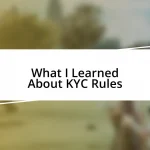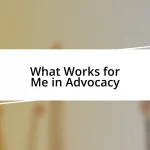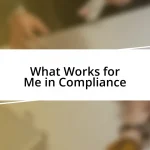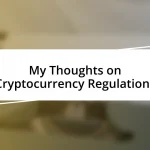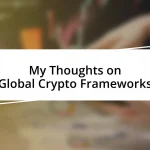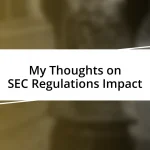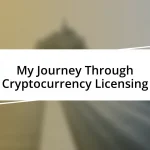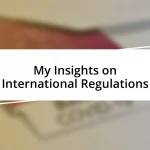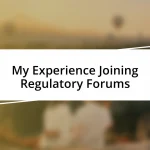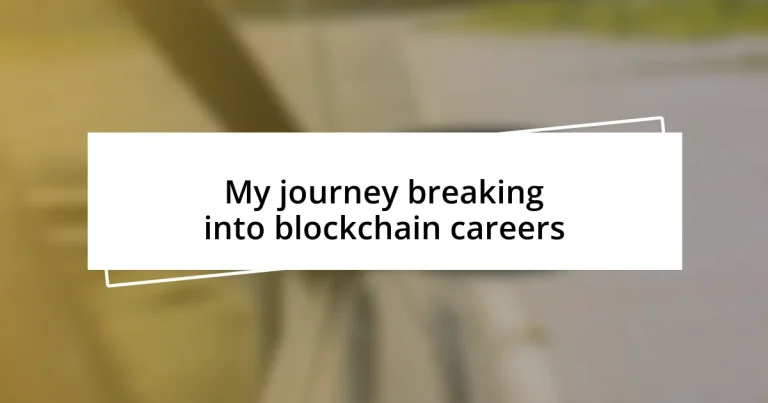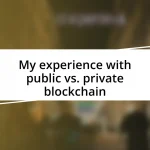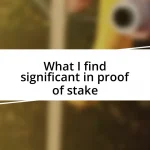Key takeaways:
- Understanding blockchain’s decentralized nature is crucial, highlighting its impact on transparency and privacy.
- Identifying personal interests in areas like DeFi, supply chain, or NFTs can guide career focuses within the blockchain space.
- Networking and continuous education, including hands-on projects and community engagement, are vital for career advancement in blockchain.
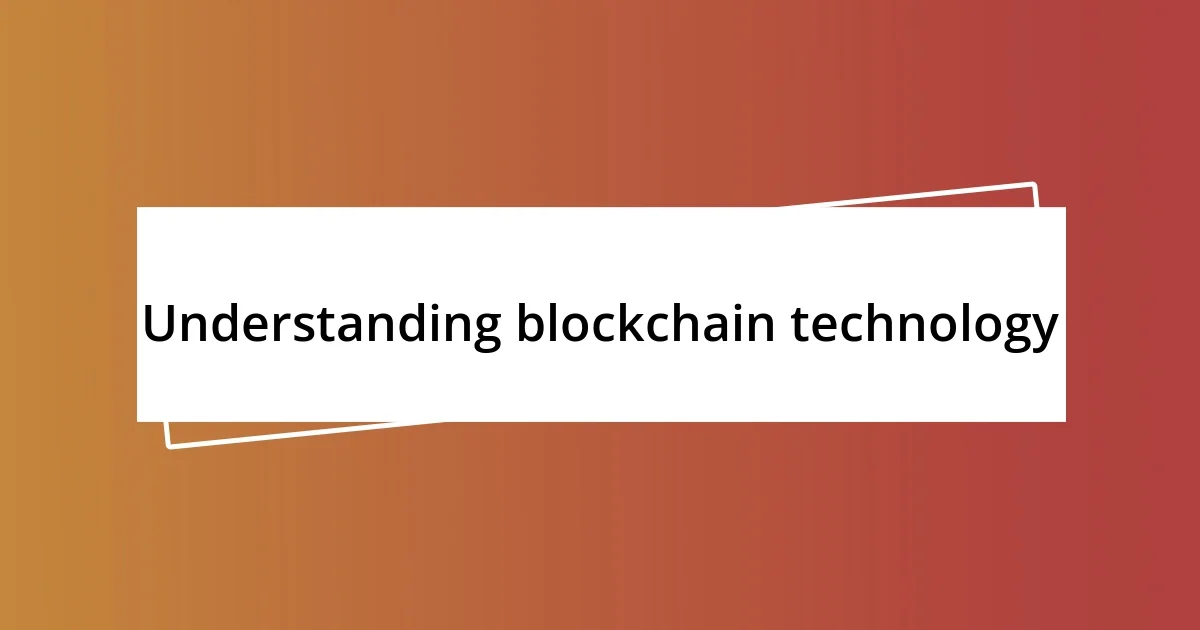
Understanding blockchain technology
Blockchain technology is often described as a decentralized digital ledger that records transactions across multiple computers. For me, the moment I grasped this concept, it felt like a light bulb went on—how empowering it was to realize that information could be verified securely without relying on a central authority! I remember sitting in a café, discussing with a friend how this could revolutionize everything from finance to supply chain management.
What excites me about blockchain is its transparency; every participant can view the same information in real-time. I once watched a documentary that showcased how blockchain could track food sources, ensuring that what we eat is not only safe but ethically sourced. Isn’t it reassuring to think that we could have this level of traceability in our daily lives?
However, it’s not without its complexities. I often wonder, how do we strike a balance between openness and privacy? This question highlights some of the ongoing debates in the blockchain community and pushes all of us to consider the implications of technology as it evolves. My journey into this space has reinforced my belief that understanding these nuances is crucial for anyone looking to build a career in blockchain.
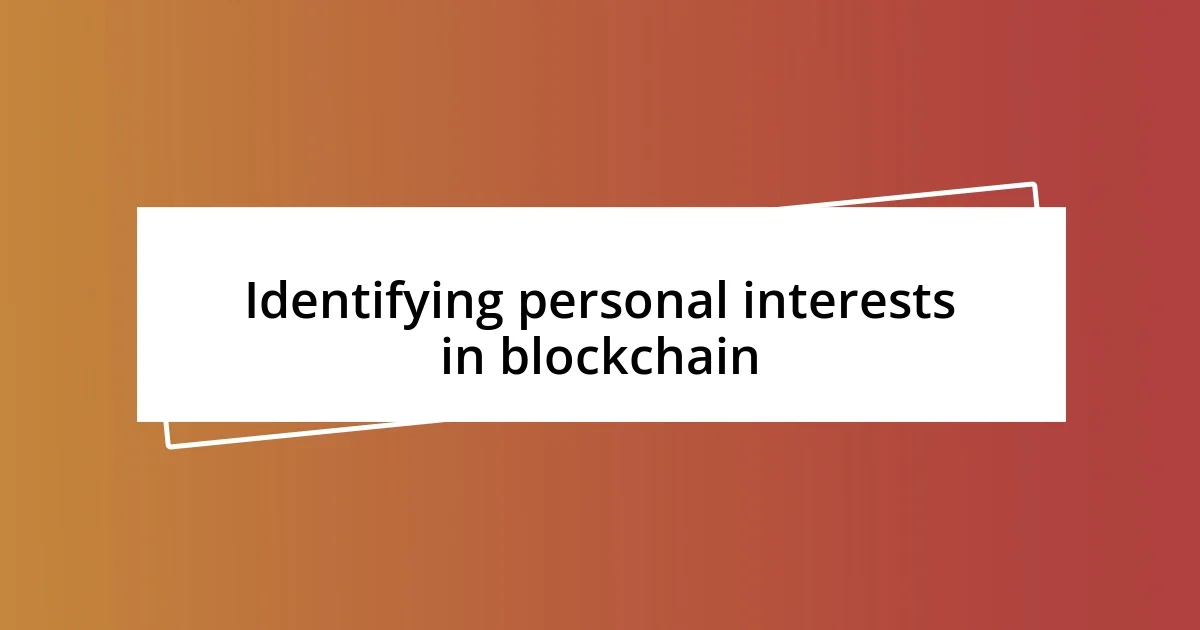
Identifying personal interests in blockchain
To identify my personal interests in blockchain, I began by reflecting on my passions. I thought about how much I loved learning about new technologies and their potential to disrupt industries. A pivotal moment for me was diving into smart contracts; it clicked when I realized how they could automate agreements without middlemen. Just picturing a world where contracts execute automatically made me excited.
Here are a few specific areas to consider when exploring your interests in blockchain:
- Decentralized Finance (DeFi): Do you have a passion for finance and want to explore lending, trading, or investing through blockchain?
- Supply Chain Management: Are you interested in improving transparency or traceability in product sourcing?
- Digital Identity: Do privacy and identity solutions drive your curiosity about how blockchain can protect personal information?
- Gaming and NFTs: Are you a gamer fascinated by how blockchain can transform ownership and in-game economies?
- Community Building: Is engaging with decentralized autonomous organizations (DAOs) and contributing to community governance appealing to you?
Once I pinpointed these areas, I felt a surge of clarity about where I wanted to focus my efforts. Each path reveals its unique challenges and opportunities, making the journey into blockchain not just about professional growth but also personal fulfillment.
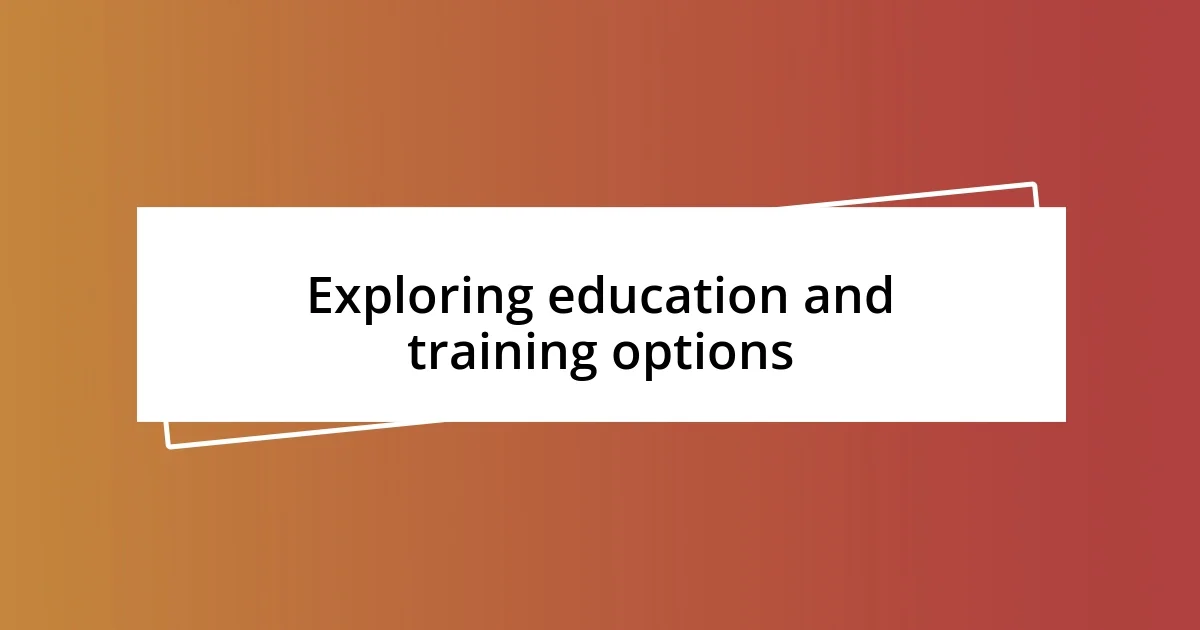
Exploring education and training options
When I began my journey into blockchain, exploring education and training options was a game-changer for me. I quickly discovered the vast array of resources available, from online courses to formal degree programs. Attending a weekend workshop was particularly enlightening; I met industry professionals who shared their insights about real-world applications and career pathways. That experience opened my eyes to how vital continuous learning is in an ever-evolving field like blockchain.
As I delved deeper into education options, I saw a remarkable variety. Some people in my network swore by MOOCs (Massive Open Online Courses), while others found value in certifications tailored to blockchain technology. I opted for a bootcamp that offered both theoretical knowledge and hands-on projects, which I found incredibly beneficial. It was rewarding to work alongside other enthusiastic learners, creating a sense of community while honing my skills.
In reflecting on the paths I encountered, it’s clear that education in blockchain is about finding the right fit for your learning style and career goals. For instance, pursuing a degree might provide a comprehensive foundation, whereas certifications could fast-track your entry into specialized areas. I often think about how my choices shaped my journey, and I encourage others to do the same. Each option presents unique benefits that can align with your aspirations and interests.
| Education Option | Description |
|---|---|
| Formal Degree | A comprehensive program typically offering in-depth knowledge of blockchain principles and applications. |
| Online Course | Flexible learning through platforms like Coursera or edX, often at a lower cost. |
| Bootcamp | Intensive, short-term programs focusing on hands-on experience and practical skills. |
| Certification | Credentials that demonstrate expertise in specific areas of blockchain, such as development or compliance. |
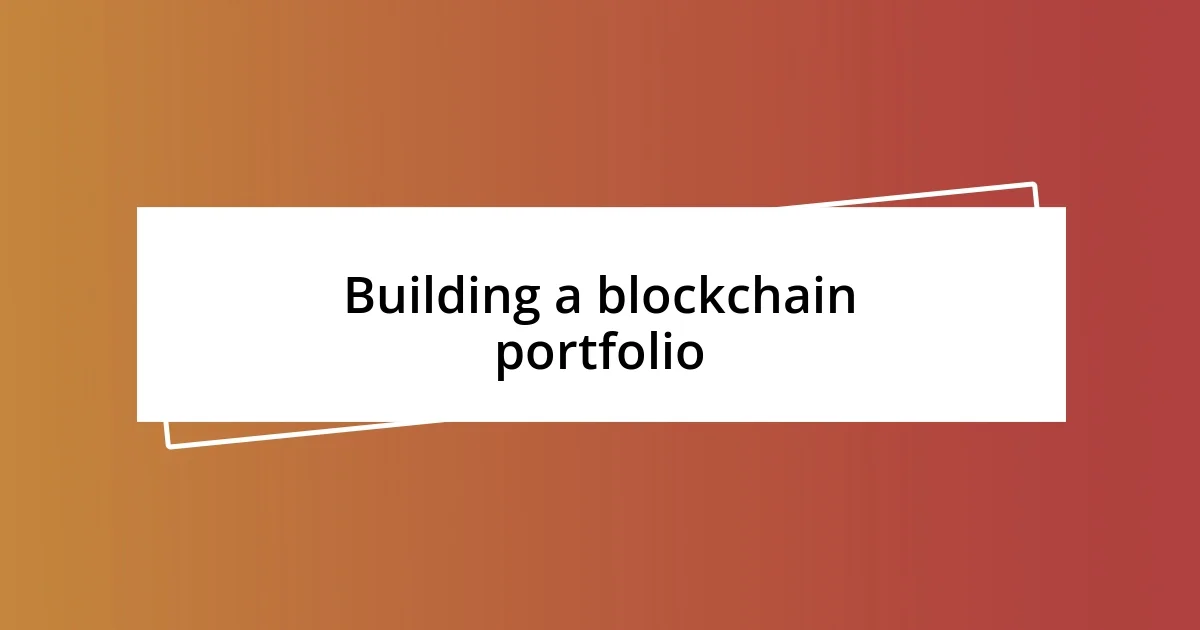
Building a blockchain portfolio
Building a blockchain portfolio is one of the most exciting aspects of entering this dynamic field. When I started, I felt overwhelmed by the sheer amount of information out there. So, I took a strategic approach: I made a list of projects I was passionate about. This led me to create my first dApp, a decentralized voting system. While it was challenging, the feeling of actually building something tangible gave me a sense of accomplishment that fueled my eagerness to explore further.
As I continued to develop my portfolio, I realized the importance of showcasing a diverse range of skills. I included projects that demonstrated my knowledge in smart contracts, blockchain integration, and even some non-fungible tokens (NFTs). By sharing my journey on platforms like GitHub, I not only provided proof of my work but also connected with other enthusiasts who offered valuable feedback. Have you ever considered how collaboration can elevate your projects? In my experience, engaging with others has sparked creative solutions and ideas that I wouldn’t have discovered on my own.
Reflecting on my portfolio today, I see it as a living document that reflects my growth. Every project, whether successful or not, added depth to my experience and understanding. It’s not just about coding but also about sharing my insights through blogs and tutorials. This dual approach helped me personally connect with the community and solidify my credibility in the blockchain space. So, when building your portfolio, think about how each piece can tell your unique story. What do you want to showcase about your journey?
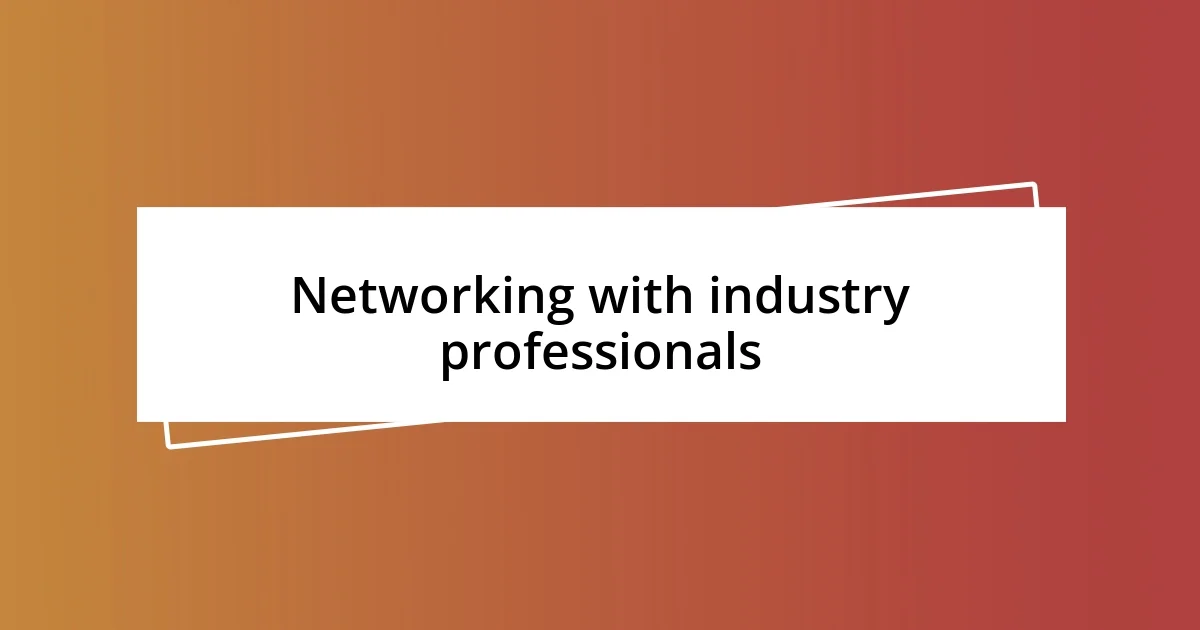
Networking with industry professionals
Engaging with industry professionals has been a pivotal part of my blockchain journey. I remember attending a local meetup where I nervously walked in, unsure of what to expect. That night, however, I connected with a veteran in the field who became a mentor. He shared not just insights about blockchain technology, but his experiences navigating the industry, which gave me clarity on my own path. Have you ever had that moment when someone’s words resonate so deeply that it shifts your perspective?
Networking isn’t just about collecting contacts; it’s about building meaningful relationships. I often recall reaching out to a speaker after a conference and asking for a coffee chat. To my surprise, he agreed, and that conversation opened doors I never anticipated, including an internship opportunity. It made me realize the power of being genuine and expressing my eagerness to learn. The blockchain community, despite its fast pace, thrives on collaboration and support, which is something we can all tap into.
Every interaction has taught me something valuable. Whether it’s a casual discussion on LinkedIn or a formal networking event, each connection can offer a unique viewpoint or opportunity. I’m continually amazed at how many professionals are willing to share their knowledge and experiences, often just a message away. Reflecting on these encounters, I encourage you to embrace these networking opportunities wholeheartedly. What insights might you gain from sharing your journey with someone who has walked the path before you?
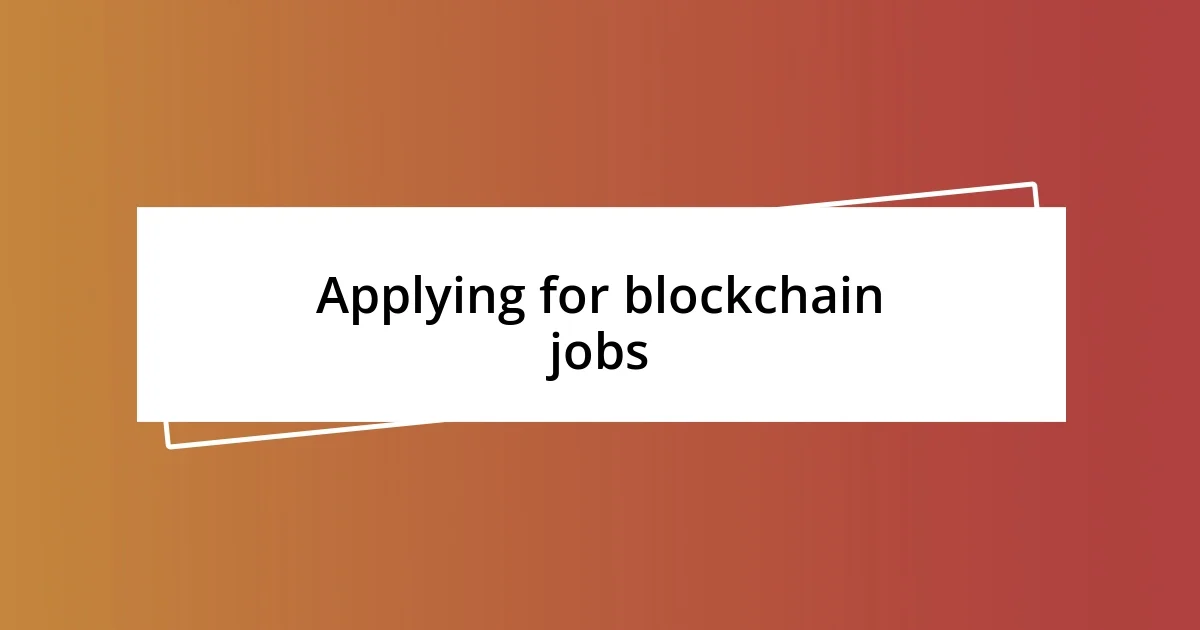
Applying for blockchain jobs
When I first started applying for blockchain jobs, I felt the pressure of standing out in a competitive landscape. I remember sending out what felt like hundreds of applications, and I began to realize that mere qualifications weren’t enough. Tailoring each CV to highlight specific skills relevant to the job description was crucial. Have you ever noticed how a small tweak can make a big difference? I ensured my cover letters reflected my genuine passion for the roles and namedrop relevant projects from my portfolio, creating a compelling narrative.
One key strategy that worked wonders for me was leveraging connections I had made in the industry. Those conversations I had during networking events turned into powerful references. I’d often follow up with people I’d spoken to, letting them know I was on the lookout for opportunities. Their willingness to introduce me to hiring managers was a game changer. It’s incredible how a simple “Hey, I found this position” could open up doors I never knew existed. I think about how proactive communication can lead to unexpected chances, and it’s a lesson worth emphasizing.
As interviews rolled in, I found that demonstrating my enthusiasm for blockchain technology often resonated deeply with hiring managers. I shared stories about my own challenges and successes while working on projects, which sometimes stirred genuine excitement on the other end of the table. Have you ever felt that rush of connection when discussing something you love? That moment reaffirmed for me the power of storytelling in interviews. Remember, it’s not just about fitting the job description; it’s about showing who you are and why you care about the work.
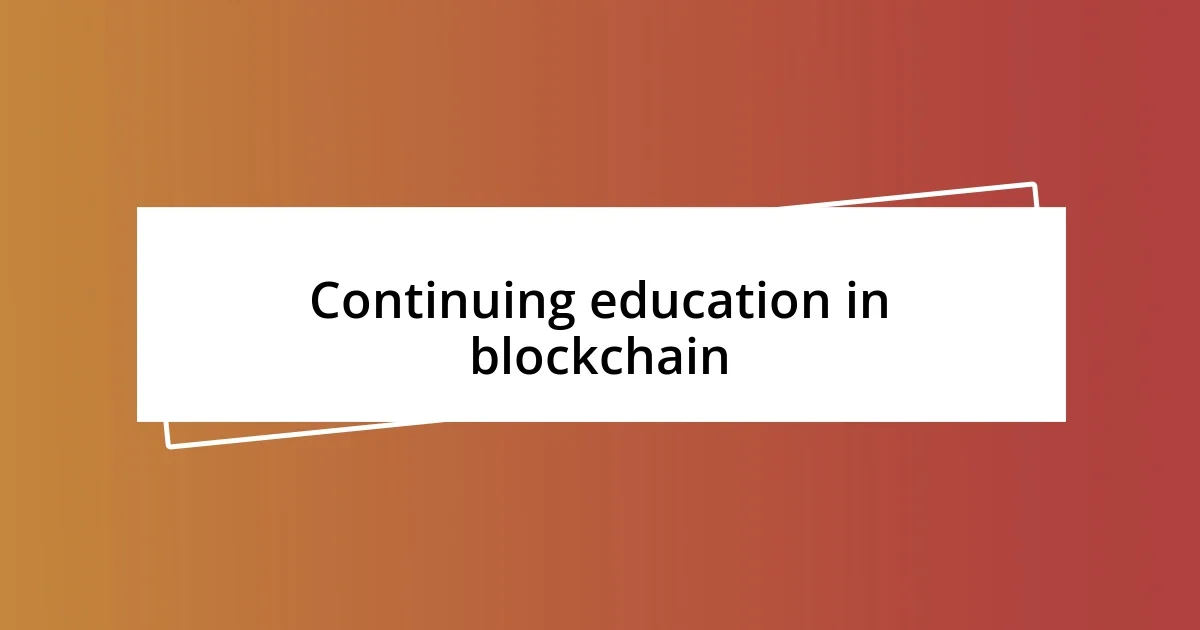
Continuing education in blockchain
Continuing education in blockchain is essential for anyone serious about building a career in this dynamic field. My journey involved diving into various online courses and certifications, each one enhancing my understanding of complex topics like smart contracts and decentralized finance. Interestingly, I once enrolled in a workshop that introduced me to blockchain coding. I remember my initial frustration with the technical complexity; it was daunting. But as I progressed, I found immense satisfaction in creating my first smart contract. Have you ever felt the thrill of mastering a new skill?
Beyond formal education, participating in webinars and conferences has been invaluable. I recall attending a virtual summit where thought leaders shared the latest trends and innovations. The live Q&A sessions were particularly enlightening, allowing me to ask questions that had been on my mind. Those interactions sparked new ideas about where I wanted to take my career. I often wonder, how could engaging directly with experts change your understanding of the industry?
Lastly, I actively sought out community-driven learning opportunities, like hackathons. My first experience at one was both exhilarating and intimidating. Working collaboratively with others under pressure was a crash course in real-world problem-solving. I learned not just from mentors, but also from peers who brought diverse perspectives. Each session was a reminder that education doesn’t just happen in classrooms—sometimes, it unfolds in the most unexpected places. How might your engagement within the community lead to more significant learning experiences?
